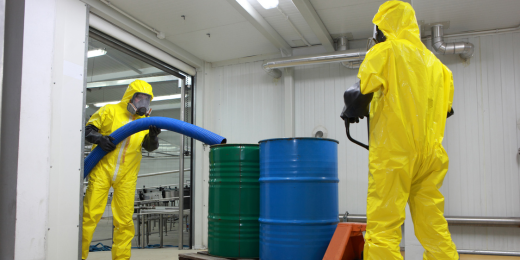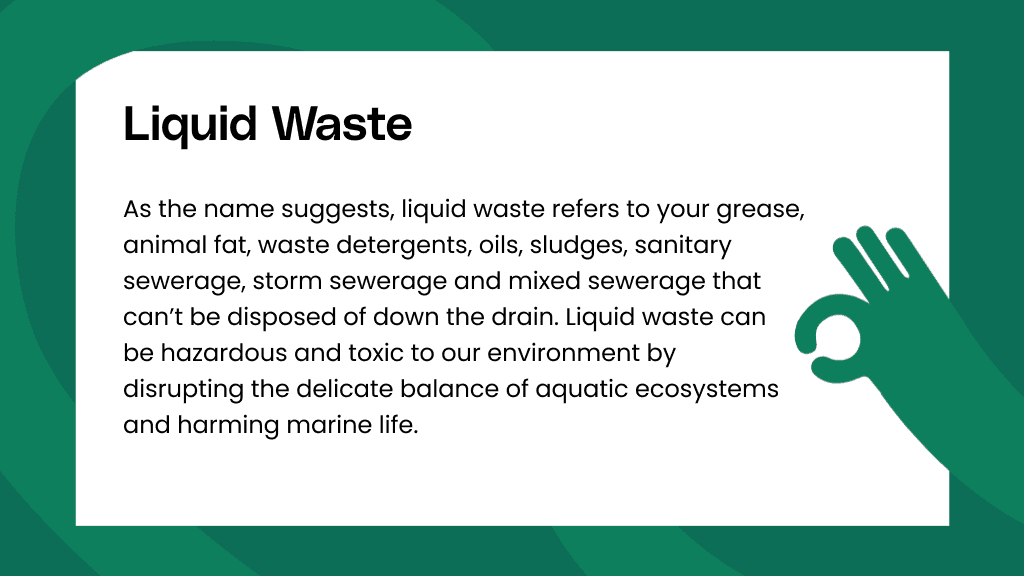Unknown Facts About Reclaim Waste
Unknown Facts About Reclaim Waste
Blog Article
Facts About Reclaim Waste Uncovered
Table of ContentsA Biased View of Reclaim WasteMore About Reclaim WasteThe 5-Minute Rule for Reclaim WasteFascination About Reclaim WasteThings about Reclaim Waste
Discover the types, occurrences, and kinds of liquid waste. Domestic sewer waste refers to the waste and products from a property septic system. This kind of waste is created by humans in houses, colleges, and other structures. This only consists of septic systems that have a drainpipe area. The appropriate administration and disposal of domestic sewer waste require fluid waste to be moved to a sewer therapy plant where the proper methods and tools are put on purify and get rid of waste.
Commercial waste commonly includes possible hazards, such as flammable products or a mixture of liquid and strong waste products, and requires an advanced and in-depth disposal procedure. The disposal of commercial waste usually includes the purification of waste prior to transportation to make sure secure and proper disposal. Industrial waste is developed from results and runoff of industrial processes and production.
This kind of waste can not utilize the exact same sewage monitoring transportation or processes as septic or industrial fluids. The hazardous waste monitoring procedure requires the assessment and screening of liquid waste prior to it undergoes the disposal process (liquid waste disposal). Overflow waste is the fluid waste that originates from overflow and excess stormwater in very booming locations or cities
Runoff waste can create contamination and flooding if not taken care of effectively. Guaranteeing appropriate waste management can stop disasters and lower ecological harm.
Getting My Reclaim Waste To Work
Call PROS Providers today to discover our waste management and disposal solutions and the appropriate means to take care of the liquid waste you create.
(https://moz.com/community/q/user/reclaimwaste1)Do you understand what happens to your water when you disengage, flush the commode or drain the cleaning device? No? Well, it deserves recognizing. This so-called 'wastewater' is not just an important resource but, after treatment, will certainly be launched to our land, waterways or the sea. Used water from toilets, showers, bathrooms, kitchen area sinks, washings and industrial procedures is understood as wastewater.

water utilized to cool down machinery or tidy plant and equipment). Stormwater, a kind of wastewater, is runoff that streams from agricultural and city areas such as roofings, parks, gardens, roadways, courses and rain address gutters right into stormwater drains pipes, after rainfall. Stormwater flows neglected directly to neighborhood creeks or rivers, ultimately getting to the ocean.
Reclaim Waste Fundamentals Explained
In Queensland, a lot of wastewater is treated at sewer therapy plants. Wastewater is transferred from domestic or commercial websites with a system of sewers and pump terminals, recognized as sewage reticulation, to a sewage therapy plant.
The Division of Natural Resources suggests city governments concerning handling, operating and keeping sewage systems and treatment plants. In unsewered areas, local federal governments may require householders to set up private or home sewage treatment systems to treat domestic wastewater from commodes, cooking areas, shower rooms and laundries. The Department of Natural Resources authorizes making use of household systems when they are confirmed to be efficient.
Most stormwater receives no therapy. In some brand-new subdivisions, therapy of some stormwater to remove trash, sand and gravel has actually started making use of gross toxin traps. Wastewater therapy takes place in four phases: Removes strong issue. Bigger solids, such as plastics and other items wrongly released to sewers, are gotten rid of when wastewater is travelled through displays.
Wastewater after that flows into big containers where solids clear up and are removed as sludge. Oil and scum are skimmed from the surface. Makes use of tiny living microorganisms understands as micro-organisms to damage down and remove continuing to be dissolved wastes and great bits. Micro-organisms and wastes are integrated in the sludge. Gets rid of nitrogen and phosphorus nutrients that can cause algal flowers in our rivers and threaten aquatic life.
The Facts About Reclaim Waste Revealed
Nutrient elimination is not readily available at all sewer therapy plants due to the fact that it needs pricey specialist devices. Clear liquid effluent created after therapy may still include disease-causing micro-organisms - liquid waste removal.

This generally indicates wastewater has to be dealt with or impurities gotten rid of prior to it can be discharged to waterways. Most wastewater flows right into the sewage system. Under the Act, regional governments carry out approvals and permits for environmentally appropriate tasks (Periods) entailing wastewater launches that could have a local influence. The division provides approvals and permits to ERAs entailing wastewater releases that could have a regional or statewide effect.
The Reclaim Waste Diaries
Or else, examples are taken for laboratory evaluation. Often many tests are needed to establish the levels of each of the different toxins such as oils, hefty metals and chemicals in water. Monitoring gives factual details about water high quality and can validate that permit conditions are being satisfied. The info obtained through tracking provides the basis for making water top quality choices.
Report this page